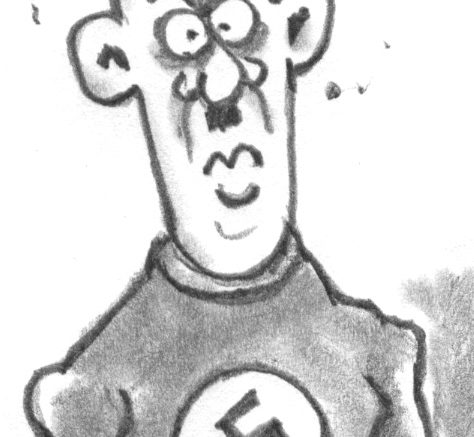
By Sean Illing
Vox (8/14/17)
“This was our Beer Hall Putsch. This was the beginning of our revolution.”
Thus concluded a post on the Daily Stormer, a popular American neo-Nazi website in which the author, Andrew Anglin, recapped the “Unite the Right” rally in Charlottesville, Virginia, this weekend.
The original “Beer Hall Putsch” was the first Nazi spectacle in 1923. It was modeled explicitly after Mussolini’s March on Rome. The putsch was an attempt by Hitler, the leader of the nascent Nazi Party, to seize power from the German government by marching to the center of Munich, alongside 2,000 fellow Nazis.
The putsch failed, amounting to little more than a crazed mob. Hitler was arrested and charged with treason. But the event became central to Hitler’s rise, as he used the subsequent trial to perform fiery speeches that were printed and reprinted in German newspapers.
There are moments, there are times, when there isn’t a gray zone, when there isn’t really room for nuance, where, if you are not resisting, you’re partaking.
On Sunday, I reached out to Timothy Snyder, a professor of European history at Yale University. Snyder has made a career of studying the history of 20th century fascism, and earlier this year released a book titled On Tyranny, a tightly argued warning about the dangers of encroaching American fascism.
I wanted to know what he thought about the events this weekend in Charlottesville, about the fact that the self-described alt-right protesters were shouting chants like “You will not replace us” and “Blood and soil” (the latter a direct reference to Nazi ideology), and about President Donald Trump’s unwillingness to condemn white supremacy in clear terms.
“There are moments,” he told me, “when there isn’t a gray zone, when there isn’t really room for nuance, where if you’re not resisting, you’re partaking.” Saturday was one such moment, and Trump’s insistence that the violence is “on many sides” was a missed opportunity to take a stand against an emergent threat.
You can read our full conversation below…
Sean Illing
What was your reaction, as a historian of fascism and a citizen, to what you saw yesterday?
Timothy Snyder
Well, my very first reaction has to do with the codependence of the American far right and Islamic terrorism. This is an administration that depends, for its legitimacy, on the threat of Islamic terrorism. And it makes policy which would seem to make Muslim terrorism more likely (i.e., the Muslim ban).
And then, at the same time, you have this incident in Charlottesville, where an American right-wing terrorist tried to take the lives of people by driving his car into a crowd of citizens, which I immediately recognized as a copycat attack modeled on the last several Muslim terrorist events in Europe, in Nice and England in particular.
That was the very first thing that struck me, that American white nationalist terrorists are copying the very people they say they abhor, that they claim to be defending us from.
And then, at the same time, you have this incident in Charlottesville, where an American right-wing terrorist tried to take the lives of people by driving his car into a crowd of citizens, which I immediately recognized as a copycat attack modeled on the last several Muslim terrorist events in Europe, in Nice and England in particular.
That was the very first thing that struck me, that American white nationalist terrorists are copying the very people they say they abhor, that they claim to be defending us from.

